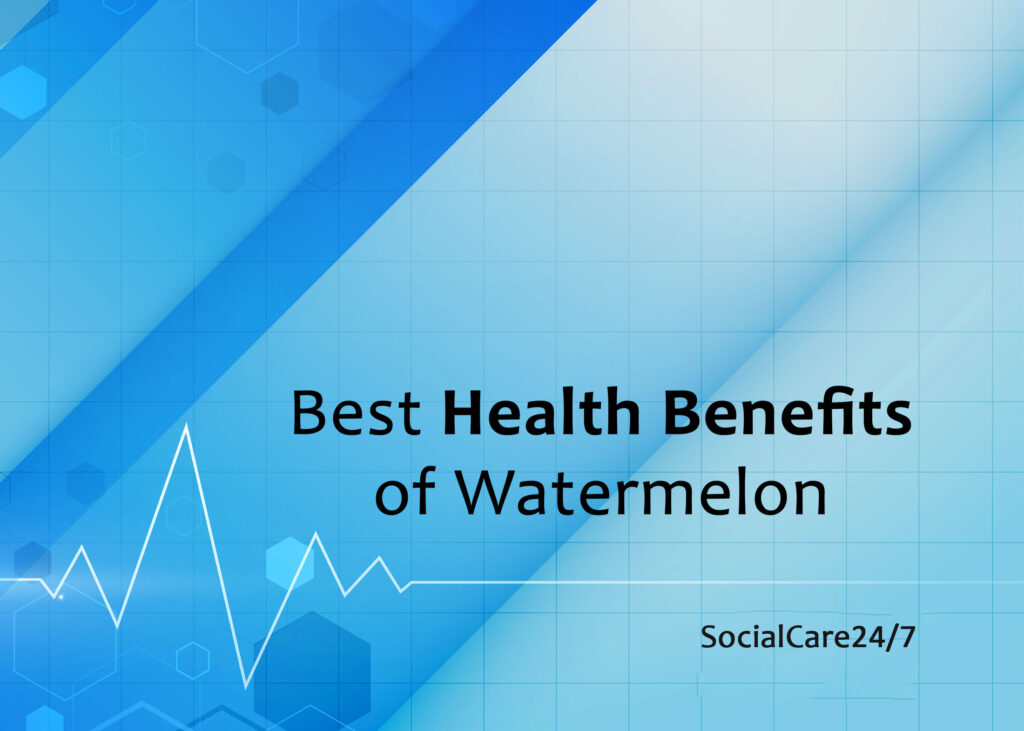Almost all people know Watermelon a member of the gourd family, is a hydrating fruit often linked to summer. Many prefer it because it’s sweet and juicy and tastes better. All must know due to its high potassium, vitamin C, and lycopene content, watermelon is healthy. Your muscles may never fatigue. It lowers blood pressure.
Watermelon’s lycopene and l-citrulline help prevent Alzheimer’s and heart disease. Healthy fruits like watermelon are low in calories. In this article, we discuss about health benefits of watermelon.
Helps You Stay Hydrated
Staying hydrated supports various physiological processes. Water helps your cells function and maintains body temperature, so drink enough. The brain and body require water, and cells need water for nutrition.
Everyone must know watermelon is mainly water, so eat it to remain hydrated. Hydrate with watermelon and other water-rich foods. This fruit is hydrated and low in calories for its size. People who wish to drink water yet monitor their calories should try it. Watermelon is a fantastic daily snack since it hydrates and fills you up.
Healthier Heart
Watermelon has various heart-health benefits. Heart health improves general health. Citrulline is crucial to this response. Because citrulline enhances blood flow, it helps lower blood pressure. Better blood flow helps the heart.
Watermelon contains heart-healthy antioxidant lycopene. Lycopene in citrus fruits decreases oxidative stress and blood vessel expansion, decreasing heart attack risk. Fruit and healthy lifestyle behaviours like daily gym attendance, not smoking, and eating less fat can enhance heart health.
Reduce Cancer Risk
Cancer is a leading killer, altering your diet and lifestyle reduces risk. Watermelon includes cancer-fighting lycopene. Lycopene decreases O2 stress and inflammation, which causes cancer.
Chronic inflammation increases gut and prostate cancer risk. Lycopene decreases edema and inhibits cancer cell growth. A study found that consuming more lycopene lowers cancer risk. Watermelon helps prevent cancer.
Great for Your Skin
Watermelon benefits your face as well. Vitamins A, B6, and C plus watermelon’s high water content benefit your face. Collagen from vitamin C firms and rejuvenates your face.
Vitamin A reduces dryness and peeling by regenerating skin cells. They also found vitamin B6 decreases acne and redness. Watermelon lycopene protects the skin from UV exposure. Watermelon can protect you from the sun, but it shouldn’t substitute for sunscreen. Keep your face protected from UV damage with SPF.
Benefits for Bones and Joints
It may benefit your bones and knees, and watermelon helps your face. Beta-cryptoxanthin in the fruit may minimize edema. However, this inflammatory impact may remain. This applies especially to those at risk of osteoporosis or reactive arthritis.
This topic requires additional investigation. Beta-cryptoxanthin may reduce joint inflammation and risk, and watermelon may prevent tight joints and strengthen bones.
Decrease Oxidative Stress and Inflammation
Chronic diseases including heart disease, diabetes, and gout begin with stress and inflammation. Watermelon has antioxidants like lycopene and vitamin C. Nutrients reduce inflammation and toxicity.
A poor diet and watermelon powder reduced oxidative stress and CRP, which indicate inflammation. Another study revealed that overweight persons with additional vitamin C had decreased inflammation. Watermelon antioxidants fight oxidative stress and edema, which cause chronic sickness.
By lowering brain oxidative damage, watermelon lycopene may prevent Alzheimer’s and other cognitive diseases. We need further study to understand how lycopene impacts Alzheimer’s.
Satisfies Your Sweet Tooth
Watermelon is a healthful dessert. Watermelon has 45.6 calories per cup. Watermelon is an excellent breakfast since it lacks sugar, fat, and salt. Its high water content keeps you satisfied and prevents harmful snacking.
Watermelon, lime, and freezing produce a delicious dessert. Simple, healthy desserts will fulfill your craving without sacrificing your health.
Supports Eye Health
All must know like every other part of your body; your eyes depend on a good diet. Watermelon has elements that can improve eye health and appearance. Its vitamin A content makes watermelon great. This vitamin helps corneas. Eleven percent of your vitamin A comes from palm-sized watermelon slices.
Lycopene and other antioxidants help stop age-related macular degeneration, the main cause of blindness in elderly people, and cataracts. Watermelon prevents age-related vision degradation.
Reduces Muscle Pain
Watermelon is nutritious and aids muscle recovery. An amino acid that stimulates muscle and blood flow, citrulline is in apples and watermelons. It reduces muscle discomfort after intense workouts by producing nitric oxide, which widens blood vessels and nourishes muscles with blood.
Citrulline also removes ammonia, a workout waste product. It reduces lactate production, which reduces post-workout soreness and speeds recovery. Drinking watermelon juice or slices after exercise helps reduce muscular discomfort and promote healing.
Conclusion
SO, in health benefits of watermelon, it hydrates protects the heart, cares for the skin, and heals muscles. Bend this fruit into numerous forms. All must know it tastes great and includes vitamins, amino acids, and other nutrients that boost health. You can feel better, stay hydrated, lower your risk of Alzheimer’s and cancer, and enhance your heart and skin with watermelon.
Eat watermelon alone, as a fruit dish, or in drinks. Keep healthy with juicy food. Healthy eating is essential; if you have food or health issues, visit a doctor.
Source links:
https://www.healthline.com/nutrition/watermelon-health-benefits#takeaway
https://www.nwhealth.edu/news/11-top-watermelon-health-benefits/
https://health.clevelandclinic.org/benefits-of-watermelon
https://www.health.com/nutrition/groceries/health-benefits-watermelon



